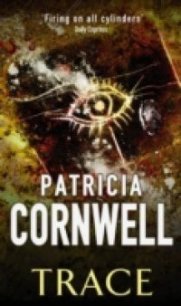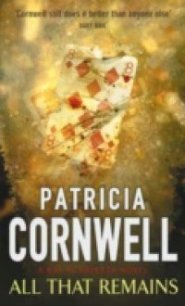The Last Precinct - Cornwell Patricia (читаем книги онлайн TXT) 📗
"Oh," is all I can think to say. "Well, that's good. It bothered me to think of you alone in a hotel." Tears flood my eyes. I am embarrassed and look away from Lucy and McGovern. I am supposed to be strong. I am the one who has always rescued my niece from trouble, most of it of her own making. I have always been the torchbearer who guided her along the right path. I put her through college. I bought her books, her first computer, sent her to any special course she wanted to attend anywhere in the country. I took her to London with me one summer. I have stood up to anyone who tried to interfere with Lucy, including her mother, who has rewarded my efforts with nothing but abuse. "You're supposed to respect me," I say to my niece as I wipe tears with my palm. "How can you anymore?"
She stands up again and looks down at me. "That's total bullshit," she says with feeling, and now Marino is returning to the living room, another bourbon in hand. "This isn't about my not respecting you," Lucy says. "Jesus Christ. Nobody in
the room has any less respect for you, Aunt Kay. But you
need help. For once, you've got to let other people help you. You sure as hell can't deal with this all by yourself, and maybe you need to sit on your pride a little and let us help, you know? It's not like I'm still ten years old. I'm twenty-eight, okay? I'm not a virgin. I've been an FBI agent, an ATF agent and am fucking rich. I could be any kind of fucking agent I want." Her wounds inflame before my eyes. She does care about being put on administrative leave; of course she cares. "And now I'm being my own agent, doing things my own way," she goes on.
"I resigned tonight," I tell her. A stunned silence follows.
"What did you say?" Marino asks me, standing in front of the fire, drinking. "You did what?"
"I told the governor," I reply, and an inexplicable calm begins to settle over me. It feels good to consider that I did something instead of everything being done to me. Maybe quitting my job makes me less a victim, if I am willing to finally admit that I am a victim. I suppose I am one, and the only comeback is to finish what Chandonne started: end my life as I have known it and start all over. What a weird and stunning thought. I tell Marino, McGovern and Lucy all about my conversation with Mike Mitchell.
"Hold on." Marino is sitting on the hearth. It is getting close to midnight and Anna is so quiet I forgot for a moment that she was in the house. Maybe she has gone to bed. "This mean you can't work cases no more?" Marino says to me.
"Not at all," I reply. "I'll be acting chief until the governor decides otherwise." No one asks me what I plan to do with the rest of my life. It really doesn't make sense to worry about some distant future when the present is shot. I am grateful not to be asked and probably am sending out my usual signals that I don't want to be asked. People sense when to remain silent, or if nothing else, I deflect their interest and they don't even realize I have just manipulated them into not probing for information that I prefer to keep to myself. I became an expert at this maneuver at a very young age when I didn't want my
classmates asking me about my father and if he was still sick
or would ever get better or what it is like to have your father die. I was conditioned not to tell, and I was conditioned not to ask, either. The last three years of my father's life were spent in absolute avoidance by my entire family, including him, especially him. He was a lot like Marino, both of them macho Italian men who seem to assume their bodies will never part company with them, no matter how ill or out of shape. I envision my father as Lucy, Marino and McGovern talk about all they plan to do and are already doing to help me, including background checks already in the works and all sorts of things The Last Precinct has to offer me.
I really am not listening. Their voices may as well be the chatter of crows as I remember the thick Miami grass of my childhood, and dried-out chinch bug husks and the key lime tree in my small backyard. My father taught me how to crack coconuts on the driveway with a hammer and a screwdriver, and I would spend an inordinate amount of time prying the fleshy, sweet white meat from the hard, hairy shell, and he got a lot of amusement from observing my obsessive labors. The coconut meat would go in the squat white refrigerator, and no one, including me, ever ate it. During blistering summer Saturdays, my father would surprise Dorothy and me now and then by bringing home two big blocks of ice from his neighborhood grocery store. We had a small, inflatable pool we filled with the hose, and my sister and I would sit on the ice, getting scorched by the sun while we froze our asses off. We would jump in and out of the pool to thaw, then perch on our frigid, slick thrones again like princesses while my father laughed at us through the living room window, laughed hilariously and tapped on the glass, playing Fats Waller full blast on the hi-fi.
My father was a good man. When he felt halfway decent he was generous, thoughtful and full of humor and fun. He was handsome, of medium height, blond and broad-shouldered when he wasn't wasted by cancer. His full name was Kay Marcellus Scarpetta III, and he insisted that his firstborn take this name, which has been in the family since
Verona. It didn't matter that I happened to arrive first, a girl. Kay is one of those names that can be assigned to either gen- der, but my mother has always called me Katie. In part, according to her, it was confusing to have two Kays in the house. Later, when that was no longer an issue because I was the only Kay left, she still called me Katie, refusing to accept my father's death, to get over it, and she still isn't over it. She won't let him go. My father died more than thirty years ago, when I was twelve, and my mother has never gone out with another man. She still wears her wedding band. She still calls me Katie.
LUCY AND MCGOVERN GO OVER PLANS UNTIL PAST
midnight. They have given up trying to include me in their conversations and no longer even seem to notice that I have slipped away to the Old Country in my mind, staring into the fire, absently massaging my stiff left hand and worming a finger under plaster to scratch my miserable, air-starved flesh. Finally, Marino yawns like a bear and pulls himself to his feet. He is made slightly unsteady by bourbon and smells like stale cigarettes, and regards me with a softness in his eyes that I might call sad love if I were willing to accept his true feelings for me. "Come on," he says to me. "Walk me out to my truck, Doc." This is his way of calling for a treaty between us. Marino is not a brute. He is feeling bad about the way he has been treating me since I was almost murdered, and he has never seen me so distant and strangely quiet.
The night is cold and still, and stars are shy behind vague clouds. From Anna's driveway, I take in the glow of her many candles in the windows and am reminded that tomorrow is Christmas Eve, the last Christmas Eve of the twentieth century. Keys disturb the peace as Marino unlocks his truck and hesitates awkwardly before opening the driver's door. "We got a lot to do. I'll meet you at the morgue early." This is not what he really wants to say. He stares up at the dark sky and sighs.
"Shit, Doc, Look, I've known for a while, okay? By now
you've figured that out. I've known what that son of a bitch Righter was up to and I had to let it run its course."
"When were you going to tell me?" I don't ask this accusingly, simply curiously.
He shrugs. "I'm glad Anna brought it up first. I know you didn't kill Diane Bray, for God's sake. But I wouldn't blame you if you had, truth be told. She was the biggest fucking bitch ever born. In my book, if you'd done her in, it would have been damn self-defense."



